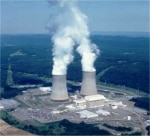Even before the Fukushima nuclear crisis hammered what some hope is another nail in the nuclear power industry coffin; the sector was in decline – but renewables gained a great deal of traction.
The rumours of a nuclear “renaissance" appear to have been premature – even prior to the Fukushima radiation emergency.
Mycle Schneider, lead author of a new report from the WorldWatch Institute says the industry was "arguably on life support before Fukushima" and that "Fukushima is likely to begin its final chapter".
As of the beginning of this month, there were 437 nuclear reactors operating globally, seven less than in 2002. While seven new reactors commenced operations in 2009 and 2010, 11 were shut down during that timeframe.
The report, entitled "The World Nuclear Industry Status Report 2010-2011: Nuclear Power in a Post-Fukushima World", states annual renewable capacity additions have been overtaking nuclear start-ups for the last 15 years. Last year, global cumulative installed capacity from biomass, waste-to-energy solar power and wind turbines bypassed installed nuclear capacity.
Among the issues nuclear power has faced is the increasing concern over safety and costs for construction spiralling; even given the generous subsidies the industry has enjoyed. The Institute says the Fukushima incident will see the construction of new nuclear plants and extending the lifetime of current reactors even more unviable.
A recent study from Queen’s University in Canada found even just taking the pre-Fukushima liability subsidies into account, if this funding were to be diverted to solar panel manufacturing, it would see more installed power and more electricity produced by solar by the middle of this century compared to nuclear.
"For the global nuclear industry, the Fukushima disaster is an historic—if not fatal—setback," says Schneider.
Late last week, the Japanese government made it illegal to enter a 20km evacuation zone around the damaged nuclear reactors and it could be six to nine months before reassessment of the zone is undertaken.












































